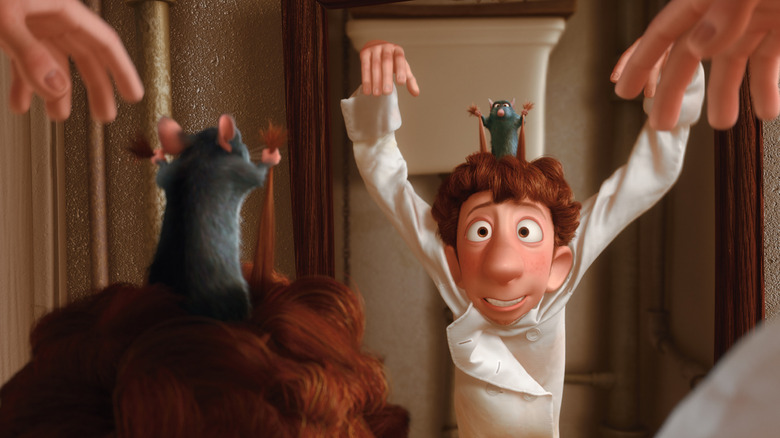The Ratatouille Scene That Went Against Traditional Animation
Animators had their plates full with "Ratatouille." They had to make the computer-generated food look appealing as Remy livens up the restaurant kitchen, and took cooking classes and served up dishes for the cause, learning how to translate the movement of cooking (bubbling sauces, steamy pots, the way sauteed veggies settle onto the plate, etc.) into palatable, lifelike visuals. And they succeeded. The various sauces and sizzling proteins look good enough to trigger hunger in their audience, as mouth-watering as any dish from a Studio Ghibli picture. The other challenge the production faced was in emulating the uncanny physicality of protagonist Linguini when he's driven by the other protagonist, a secret rodent.
Remy (Patton Oswalt) is a rat, and rats scavenge for their food. While it's fine enough for his father Django (Brian Dennehy), Remy's advanced palate (which can take one bite of a semisoft cheese and immediately identify it as Tomme de Chevre) craves more than just fuel. He wants food that has been prepared, not discarded. The first few minutes of "Ratatouille" contain Remy's longing:
"I know I'm supposed to hate humans, but there's something about them. They don't just survive, they discover, they create. I mean, just look at what they do with food."
The rat gets his chance when he's visited by the ghost of cuisine past — famed French chef Auguste Gusteau (Brad Garrett), who died of a broken heart in the wake of a scathing review by food critic Anton Ego. Gusteau points out a young garbage boy attempting to secretly cook at Gusteau's restaurant, Alfredo Linguini (Lou Romano), who — through a series of misadventures — convinces Remy to help him cook at the Michelin-rated establishment. The pair work out a system where Remy hides under the boy's toque, allowing him to manipulate Linguini's arms by pulling his hair. The guidance enables Remy to exercise his culinary skills without having, well, a visible rat in the kitchen. The resulting movement has a "Weekend At Bernie's" feel to it, with Linguini a passenger to his own mobility. Such jerky, top-heavy physicality flies in the face of everything animators are taught, but the animation team was up for the challenge.
'Something new'
Urgency and spontaneity sat due north in every aspect of the scene, but "Animation is not a spontaneous art form," explains "Ratatouille" screenwriter and director Brad Bird in the video above. "It has to be very carefully done, very meticulously done. But like so many arts, if you do it right, people are not aware of the complexity." In the "Something New" featurette from Pixar, Bird and several animation team members lay out the necessity of the visuals to employ the story's physical comedy.
While crafting immaculate dishes at Gusteau's, Linguini is not at the controls, but still fully cognizant and aware of his actions — what Bird terms an 80:20 ratio of agency, with Remy taking the lion's share of control. Not only is Remy manipulating his movements like a marionette, but the young cook has to react to those head jerks and clunky arm swings in real-time. The clip includes footage from a "Ratatouille" animation briefing, in which Bird instructs the team to "Imagine that his head is being jerked around to give Remy a clear view, just like he's turning a crane to see, "What's over there?" As animator Kristophe Vergne explains, the approach was unorthodox to artists trained to make human movement look organic and graceful. When presented with rough animated versions of the scene, Bird encouraged his collaborators to use the camera reactively in that moment, even going so far as to allow Linguini to briefly fall out of frame.
The bonus challenge, resulting from those unnatural movements, came with the voice acting. Lou Romano, who previously provided voice work for Pixar's "Cars" and "The Incredibles," was tasked with ad-libbing Linguini's reactions to Remy's noggin navigation. The most amusing part of the clip observes Romano watching the animation and peppering in grunts, whimpers, and desperate vague-splanations to the bewildered kitchen staff. Just listening to the audio, Romano switches up the inflection and volume so well that the scene takes on an "Idle Hands" layer of humor as Linguini tries to keep up with a foreign body dominating his own. By bridging the spontaneity between Linguini visually, spatially, and aurally, the resulting sequence is one of the film's most memorable — and the most savory.
